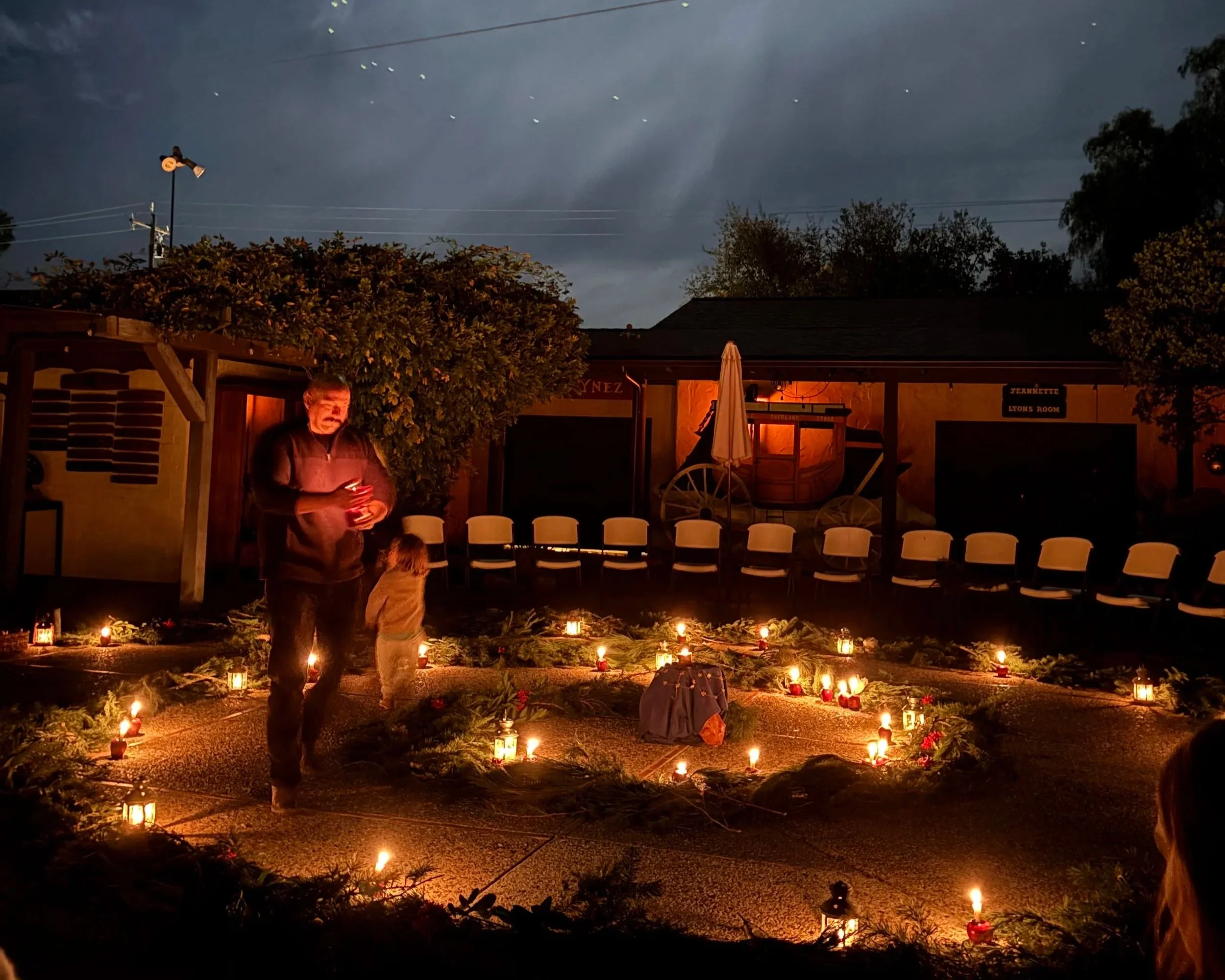How Waldorf Educates The Whole Child
Imagine planting a seed in your garden that will take 21 years before bearing fruit. The plant will need different care as a young tender seedling than will be needed in future stages of its growth. When caring for this plant in the early years, you’ll want to make certain that it has been planted in rich soil that will nourish it well and that it receives the right amount of sunlight and water to take root, all while giving it the time it needs by not rushing its growth. Waldorf Education places a tremendous focus on the early years, as it is the time when nurturing the young child with a holistic approach supports their healthy development and slowly prepares them for a lifetime ahead into an unknown future.
On a deep level, I believe that we recognize that our experiences in early childhood are the foundation for life and prepare us for the rest of our lives. Knowing that early childhood is the foundation upon which we develop, the question then becomes, “What kind of experiences do young children need to grow and flourish to their full potential?” In today’s educational environment, the typical early childhood classroom has become a place of academic learning and testing, leaving little time and space for children to play, discover, and learn about themselves and life in creative and imaginative ways. In many ways, education has become all about filling a child’s mind with information, and although the acquisition of knowledge may lead us to our life’s work, it doesn’t necessarily lead us to feeling at peace with who we are in the world.
When the foundation of education rests on what children truly need at each developmental stage, the very nature of that education will be holistic. This is the philosophy you will find in Waldorf Education, as its approach is to educate the whole child by developing the physical, social, intellectual, artistic, practical, and moral capacities. The foundation of this education, as in human development, begins in early childhood. Just like we couldn’t, as much as we might try, force our child to skip over their early years in an attempt to make them develop faster and beyond their capability, the same applies to the foundation of Waldorf Education. A foundation that focuses on a holistic, developmental approach, one that strengthens roots so healthy growth is possible. The early childhood years are the roots and need to be nurtured and nourished with time and space to grow and blossom.
Brain research tells us that foundational pathways must be developed before academic instruction begins, and for young children, this happens in play. Waldorf Early Childhood classrooms provide rich, nurturing sensory experiences where children experience self-directed free play, which is critical for healthy physical, social, emotional, and overall brain development. Play offers experiences that literally build neural pathways. Play is a precursor to the later development of intellectual capacities and prepares children for later academic skills such as reading, writing, and math. Play integrates the senses, which enable the child to be more fully connected with themselves, which essentially is to be centered and grounded, knowing who they are. For young children, this means that the parents, teachers, and caregiver need to focusi on nurturing the senses and respecting their need to play.
As parents, you nurture your child right from birth with the goal of them being well educated, and it’s definitely a journey. Through the lens of Waldorf Education, this journey begins with nurturing your young child from the inside out with a focus on offering varied experiences that engage them in activities that strengthen the senses and, in doing so, nurtures their sense of self and self-esteem. In his many lectures, Rudolf Steiner, the founder of Waldorf Education, revealed that the gateway to your child developing to their full potential is through the healthy development, in the early childhood years, of the four foundational senses: sense of touch, sense of well-being, sense of self-movement, and sense of balance. When the foundational senses have been nurtured and nourished with healthy experiences that focus on the young child’s developing physical body, they will be more prepared to meet the academic challenges that they’ll later face. Waldorf Education focuses on a holistic, developmental approach, one that addresses the physical, cognitive, and spiritual needs of children from the perspective of connection with oneself at each stage of development. Research shows us that lack of connection with oneself not only makes it difficult to learn, it makes it challenging to connect with others.
In today’s fast-paced, test-driven educational landscape, the concept of “educating the whole child” is often spoken of, but rarely practiced in its fullest form. For over 100 years, Waldorf Education has steadfastly offered a deeply human and developmentally aligned alternative—one that honors not just the intellect, but the heart and hands as well. It is an education for the whole child: head, heart, and hands.
Developed by Austrian philosopher Rudolf Steiner in 1919, Waldorf Education (also known as Steiner Education) was designed to support the healthy development of children in body, mind, and spirit. It is rooted in a spiritual understanding of the human being, and it seeks to cultivate not only the intellect, but also a deep sense of morality, unlimited creativity, and a joyful life long love of learning.
This article explores the many ways Waldorf Education nurtures the whole child, physically, emotionally, intellectually, socially, and spiritually and why this holistic approach remains profoundly relevant for families and educators today.
Educating the Head
Waldorf Education absolutely values intellectual development, and at the same time, it approaches it differently than conventional education. Rather than focusing on early academics and memorization, Waldorf schools align cognitive learning with developmental readiness. This means formal reading instruction typically begins around age 7, when children are developmentally prepared for abstract thinking.
The Waldorf curriculum is carefully designed to unfold in harmony with the stages of child development. In the early grades, learning is deeply connected to storytelling, movement, nature, and the arts. As children grow, the content of the curriculum evolves to meet the emotional and intellectual capacities of each age. Let's peek at grades 1, 4, and 8.
Grade 1: Focuses on fairy tales, letters, and numbers—feeding the imagination while introducing foundational skills.
Grade 4: Introduces Norse mythology, fractions, and animal studies, reflecting a growing sense of individuality and complexity.
Grade 8: Offers revolutions, industrial history, and organic chemistry, supporting the adolescent’s growing capacity for analysis and moral judgment.
Subjects are not taught in isolation. Math, science, history, and literature are integrated with movement, storytelling, visual arts, and music. This interdisciplinary approach helps children make meaningful connections and internalize knowledge at a deeper level.
By emphasizing understanding over memorization, and imagination over rote learning, Waldorf Education cultivates thinkers who are not only capable but curious, ready to ask questions, explore ideas, and engage with the world in thoughtful ways.
Educating the Heart
Waldorf educators recognize that emotional intelligence is just as important as academic ability. Children are not machines to be programmed—they are sensitive beings with emotional lives that deeply influence how they learn and relate to the world. This is why the very heart of Waldorf Education lies in storytelling. Through fairy tales, legends, fables, and myths, children are guided into the inner realms of feeling and imagination. Hearing these stories, in their early years, helps children make sense of the world; they offer moral imagery - learning right from wrong, and an emotional component that cultivates empathy and compassion.
The teacher, as storyteller, brings the material to life in a warm, human way. There are no screens or textbooks in the early years—just the living presence of the teacher and the beauty of language. This approach strengthens the bond between teacher and student while fostering empathy, wonder, and imagination.
Educating the Hands
In Waldorf Education, learning is not a passive experience. Children engage with their whole bodies—moving, making, drawing, singing, building, and gardening. These activities are not extracurriculars; they are essential to healthy development and are treated with the same importance as academic subjects. In this way, the whole child is educated, not just parts. From early childhood onward, children are engaged in meaningful, purposeful work with their hands. They learn to knit, crochet, sew, and eventually carve and build with wood. These activities develop fine motor skills, eye-hand coordination, perseverance, spatial awareness, and a sense of pride in craftsmanship. And perhaps even more importantly, working with our hands nourishes the Will. In Waldorf Education, the Will is our capacity to take initiative, follow through, and bring intention into action. Educating the Will is just as important as educating the mind.
Preparing for Life, Not Just for Tests
Waldorf Education doesn’t “teach to the test.” In fact, most Waldorf schools delay standardized testing until the later grades, if at all. Instead, they prioritize deep learning, creativity, emotional resilience, and real-world skills. Graduates of Waldorf schools often report a strong sense of self, an ability to think independently, and a lifelong love of learning. Many go on to excel in diverse fields, from medicine and science to the arts, education, and entrepreneurship.
What they carry with them is not just academic knowledge, but a well-rounded sense of who they are and how they can serve the world.
Some final words
In a world increasingly dominated by screens, speed, and standardized thinking, Waldorf Education offers a refuge and a strong vision of how educating children can be healing, and children receive this from their preschool years onwards. It sees the child not as a vessel to be filled, but as a unique being who is unfolding.
To educate the whole child means to nurture not only the head, but the heart, the hands, and the spirit. It means recognizing that childhood is not a race, but a sacred journey. It seeks to offer children an education that is both grounding and inspiring, practical and disciplined, and full of wonder.
Waldorf Education aligns with those seeking a slower, more intentional path; it offers a deeply supportive foundation for both children and parents. It invites us to trust the unfolding of life, to honor the rhythms of nature, and to raise our children with warmth, wisdom, and reverence. It is an education for life.
I’ll leave you with this quote that I’ve shared with parents for years.
“I am struck by the fact that the more slowly trees grow at first, the sounder they are at the core, and I think that the same is true of human beings. We do not wish to see children precocious, making great strides in their early years like sprouts, producing a soft and perishable timber, but better if they expand slowly at first, as if contending with difficulties, and so are solidified and perfected.” Henry David Thoreau
About the Author: Chinyelu Kunz
Chinyelu Kunz is a Waldorf-trained early childhood expert, parenting expert, Mom of 3, Joint Head at Hundred Hills School, and founder of We Nurture Collective.
She is the author of The Little Book of Parenting and her latest book, Away to Dreamland.





